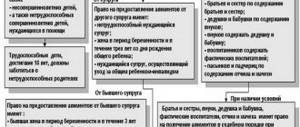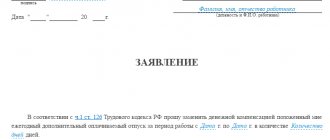After the divorce, left with two children in their arms, one of the parents is forced to file a claim in court to collect alimony from the second spouse. How to write an application to the court for the recovery of alimony for two children left without financial support and how are such claims considered?
You may also be interested in:
- What percentage is child support for 2 children?
- How much child support is required for three children? (Examples of calculations)
- Collection of alimony - procedure, payment, judicial practice
Basic theory
In order for a claim to be accepted for consideration on its merits without any delay, its text must contain a detailed justification of the claims being made in conjunction with documentary evidence. The amount of the requested monetary payments can be expressed either in hard cash or in a specific percentage. The choice of the method by which the percentage of payments will be calculated strictly depends on:
- the amount of the defendant’s income;
- features of settlement with him by his employer;
- the living wage established in the territory where the child is registered;
- the standard of living of the parent in whose care the minor is left;
- the presence (or absence) of features in the development, upbringing, health, education of the child.
The circumstances under which it is important to draw up a statement of claim for the recovery of alimony for a second child are a fairly extensive list. So, in accordance with the position of the legislator, stated in paragraph 1 of Art. 80 of the RF IC, parents of a child in need of support can be either in the stage of dissolution of a marital relationship or in a long-standing divorce, living together or separately.
Conditions for forced collection of alimony
To go to court, documentary evidence is required about:
- the fact of the birth of a child;
- number of children;
- the status of a parent or adoptive parent or guardian (recorded in the birth certificate or through a court order);
- the defendant’s obvious evasion from paying the funds required to support one (or two) minors.
At the same time, there should not be a valid voluntary agreement on the payment of alimony contributions between the participants in the legal relationship under consideration.
Filing a claim is the unconditional right of the parent, as well as another person in whose care the child remains. It can be carried out regardless of:
- the nature of the marriage union (first or Nth marriage, reasons accompanying these legal relations, etc. circumstances);
- the presence or absence of its registration with the registry office;
- the nature of the relationship and the degree of participation of the defendant in the maintenance of the child (there is a fact of joint or separate residence, etc.);
- the defendant’s form of employment, as well as his level of earnings;
- the fullness of his civil rights (including imprisonment);
- the specific age of the child (in some cases, unpaid financial support may be claimed even after he reaches the age of majority).
Amount of alimony
How much material resources to allocate from your total income depends, first of all, on the specifics of providing alimony payments. If this happens voluntarily, then the amount will be one (usually the one approved by the parents themselves), and if it is forced, then completely different (established by a judge on the basis of articles of the Family Code, as well as some Federal laws).
Payments according to agreement
If a parent, who pays child support for two minor children, wants to provide payments for them on the basis of an agreement, then he has the right to determine their amount by mutual agreement with the second parent.
Thus, if he is already paying money under such an agreement for one child, and the amount fixed in this document completely suits him, then all that remains is to draw up an agreement on the provision of alimony payments for the second child. After this, the parent will simply have to fulfill his obligations under both agreements.
An agreement to provide alimony maintenance has the following advantages:
- Gives freedom of action to the payer and recipient. When going to court, the writ of execution, which will be issued to individuals as a regulation for the procedure for calculating alimony benefits, will be drawn up clearly according to the rules dictated by law. And when concluding an agreement, the parties themselves can determine the conditions, amount, form, as well as other nuances regarding payments.
- Refers to confidential documents. Since when concluding an alimony agreement it is implied that the payer voluntarily agreed to fulfill all the obligations enshrined in this document, no case is opened in court, and as a result, the employer is not asked to collect monetary compensation for the children from his employee’s wages. Thus, when concluding an agreement, an individual can easily hide the fact that he is the payer of alimony.
- Quick and easy to complete. If parents want to resolve a conflict regarding the maintenance of their children as quickly as possible, then the best option would be to draw up a child support agreement. They will not need to collect a huge number of documents, appear at a court hearing and wait a long time for a decision to be made. You just need to draw up an agreement, sign it and have it certified by a notary. In addition, if there is something wrong in the agreement, the notary will help correct this defect.
Important! Be careful about the amount of child support you specify in the contract. The minimum amount of these payments should be exactly the same as the amount of alimony that would be established through the court. As for the maximum size, there are no restrictions.
Alimony payments by order
If the relationship between the father and mother of the children is extremely difficult, preventing them from coming to an agreement on alimony, or one of the parents is completely indifferent to this issue, then it is necessary to seek help from the court. This is exactly what the first part of Article 81 of the Family Code of the Russian Federation says. The same article also notes several rules regarding the amount of alimony:
- For two children, 1/3 of the salary is paid. If an individual has two minor children to whom he has child support obligations, then he is obliged to give them a third (or 33%) of all types of his earnings. However, if he currently pays alimony for one child (as a rule, this is a quarter of the profit or 25%), then in the case of payment of benefits for a new child, the amount of the previous alimony will be slightly reduced. The first child will no longer receive 25%, but 16.5%, since a total of 33% must be provided for both children. The second child, in turn, also needs to transfer 16.5%.
- Adjustment of the amount of benefits and regularity of payment. By law, children must receive financial assistance from the mother/father who has child support obligations to them every month. As for the amount of benefits, 33% of income is not a strictly fixed figure; in the case of an extremely difficult financial or family situation of the recipient or payer, it can be adjusted.
For example, if a father already pays alimony for his five-year-old daughter, which is collected from him according to a writ of execution in the amount of one quarter of the monthly profit, then when deducting maintenance from his income for another minor child, he has the right to reduce their amount by nine percent. To do this, you will need to write an application to reduce the amount of alimony payments in connection with the start of providing financial support for the second child and send it to the magistrate’s court.
This is important to know: Relieving a guardian of duties
Procedure for filing a claim in court
In accordance with the official position of the legislator, prescribed in Art. 23 of the Code of Civil Procedure of the Russian Federation, consideration of the described issue is within the competence of the magistrates' courts. The state fee for this category of cases must be paid to the defendant.
It should be remembered that consideration of the merits of the claim document can be carried out at the place of primary residence (or registration) of both its drafter and the alleged defendant. The right to choose a specific court is given to the plaintiff.
The legislator provides two ways in which financial support can be collected from a child:
- drawing up a request for a court order;
- actually filing a claim.
The first is a simpler procedure. The stated request is considered within one working week. There will be no hearing on the merits of the case. The paper is submitted subject to the exact indication of the defendant’s place of residence. The court demand itself can only contain an order for regular payments of a specific share of his income. It should be taken into account that the legislator reserves the debtor the unconditional right to challenge the judicial claim within the established period of any justification. In this case, the plaintiff will be advised to resort to the second method - filing a claim.
A claim for child support for a second child is considered within 30 days.
In order to take into account all the nuances, a court hearing is necessary. Funds can be claimed either in a fixed amount or by accruing interest. In addition, it is possible to confiscate the debtor’s property.
After a satisfactory resolution of the case on the merits, the financial support of the child is considered assigned from the moment the claim document is submitted for consideration.
When can you collect housing support?
Russian legislation protects the interests of motherhood and childhood. However, when collecting additional payments for housing, the court will take into account the balance of interests of all parties . In each situation the conditions will be different.
You can apply for housing support if the following conditions are fully met:
- The alimony payer is able to work .
- The parent living with the child does not have suitable housing .
- The applicant is in a difficult life situation . He must prove that he cannot cope with renting a house on his own and does not have enough money to buy it.
The court will also take into account other points: the amount of alimony already assigned, the income of both parents, the composition of their new families, etc. Additional payments can be recovered from a minor or an adult incapacitated child.
In general, residential premises are considered unsuitable for habitation (according to Resolution No. 47 of January 28, 2006) if:
- The building's performance has deteriorated due to wear and tear. The house has become unstable, unreliable, and there is a risk of destruction.
- The microclimate or environmental conditions in the room have changed for the worse; this violates hygienic and sanitary requirements. For example, the noise level has increased, and a fungus has appeared that cannot be removed.
- The building was damaged as a result of force majeure: fire, flood, accident.
- The premises are located in an area likely to be affected by a hypothetical man-made disaster or natural disaster.
You can also try to collect money if the parent and child simply do not have suitable living space, that is, they have nowhere to live . This refers not only to the right of ownership, but also the right to use. For example, if a mother and child are registered in a grandmother’s apartment, then they are unlikely to be considered in need of housing.
Who is eligible to apply?
In accordance with the position of the legislator, in 2021 a written request for payment of allowance can be drawn up:
- directly concerned parent;
- guardian;
- an employee of an organization whose main responsibilities include ensuring the material maintenance, upbringing and development of the child;
- an employee of another relevant government agency whose main profile includes caring for minors.
If a petition for financial support is drawn up by a parent, to consider the document on its merits, the latter’s active participation in the fate of the child is required. In particular, the main evidence of the fairness of the claim includes the cohabitation of the author of the claim with a minor.
Provided that the child is left without financial assistance from his parents, the right to claim it passes to his guardian or employees of the above institutions. Moreover, these persons must have not a nominal, but an actual (documented) status, the acquisition of which is accompanied by an official document issued by the guardianship authorities.
If a child lives with his relatives, the latter are not entitled to apply for financial assistance for his maintenance.
New law on child support for housing
In 2021, in Russia it became possible to collect additional money for housing for the child. This is provided for by the new law No. 10-FZ of 02/06/2020, which amended Part 1 of Article 86 of the Family Code (FC) of the Russian Federation. The legislation now includes wording that each parent may be required to bear additional expenses for the child in the “lack of suitable residential premises for permanent residence.”
Before the law was introduced, there were attempts to go to court for money in addition to alimony if a parent and a child have nowhere to live. After all, the list of circumstances listed in the Investigative Committee was not closed. But judges often rejected applicants for the reason that the IC only listed health problems. The new law on housing support has brought clarity and provided more opportunities to support a child’s life at a decent level.
Documentary evidence confirming the right to draw up a statement of claim
In order to file a complaint for the recovery of financial support, it is necessary to have a relatively small list of documentary evidence, the main one of which is the child’s birth certificate.
In the event that information about the minor’s father is not contained in the specified document (or they are included in the form at the request of the mother and against his good will), in order to achieve a positive court decision, a number of procedural procedures will need to be carried out. In particular, in the manner prescribed by the legislator, establish the biological affiliation of the child with the alleged defendant. As for the other categories of applicants, for a successful resolution of the case they must accompany their petition with documentary evidence of the status that provides the legal basis for the demands addressed to the defendant.
To confirm the fact of cohabitation with a minor who needs the financial participation of his parent, it is required to submit a certificate to the judicial authority, signed by an authorized person of the housing and communal services. The utility service must be directly related to the dwelling in which the plaintiff and the child under his care live.
In what cases can you apply for alimony?
Child support, regardless of the number of children, must be collected from one of the parents if there are certain grounds for this.
- The children of the alimony payer must be his own or adopted by him. To confirm the relationship of children with him you need to have any of the following documents:
- birth certificates of both children, which contain information about the parents;
- a document issued by the civil registry office establishing paternity;
- documents evidencing adoption;
- court decisions on confirmed paternity of children.
- Both children must be under 18 years of age. It does not matter whether the children are from different marriages or from the same marriage.
- The parent must also pay child support if the child has reached the age of majority, but is unable to work.
Alimony for two children
Additional documents required to file a claim
One of the equally important, but not primary values for a favorable resolution of the case of collecting alimony for a second child is documentary evidence of both the conclusion and the dissolution of the marriage. Not being included in the list of mandatory ones, this evidence allows you to persuade the assessor to the position of the plaintiff.
In addition, when considering a claim for child support, a certificate containing reliable information about the defendant’s place of work, as well as the amount of monthly payments made by the employer to his account, has significant weight. Such documents are usually issued for a period of 12 months and allow the chairman of the court to make the necessary calculations to determine the amount of monthly payments that the defendant will be required to make. All such information, if the decision is positive (in favor of the plaintiff), is subsequently noted in specially designated columns that each writ of execution has. Such measures significantly speed up the subsequent mechanism for claiming alimony payments.
A less important (but, however, by no means useless) document accompanying the statement of claim is its copy. This paper is intended to be served on the defendant.
Copies of all listed documents are attached to the claim. As for their originals, they are presented directly to the chairman of the court for review.
Does the statute of limitations apply for alimony?
According to the Family Code, the statute of limitations does not apply to family legal relations. This means that you can file a claim for alimony in court at any time.
However, there is such a thing as a suspended period, that is, the period after which the right to alimony ceases. As a general rule, this period is when the child reaches 18 years of age. But there are exceptions, which include those who are unable to work and those in need of financial assistance, as well as disabled children.
You can also collect alimony for the past period. In this case, a three-year period applies from the date of application to the court. In this case, the following conditions must be met:
- the plaintiff took measures to obtain funds for the maintenance of the child (this can be proven using witness testimony, providing correspondence with the defendant, etc.);
- the defendant avoided providing them.
Thus, alimony is calculated from the day the application is filed with the court until the child reaches the age of majority. Payments can also be recovered for the previous 3 years from the date of going to court and no more than the child’s 18th birthday.









